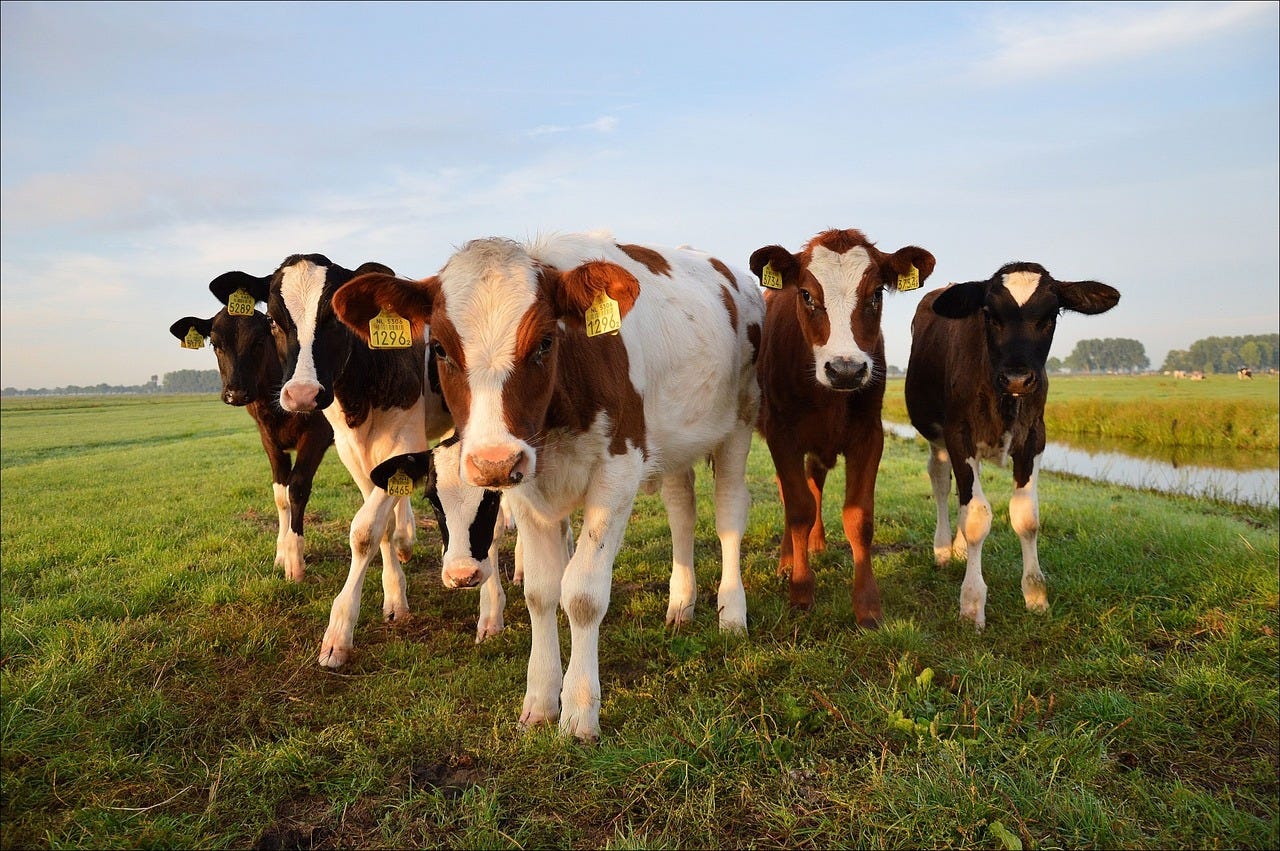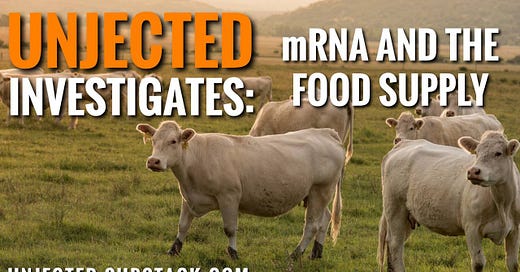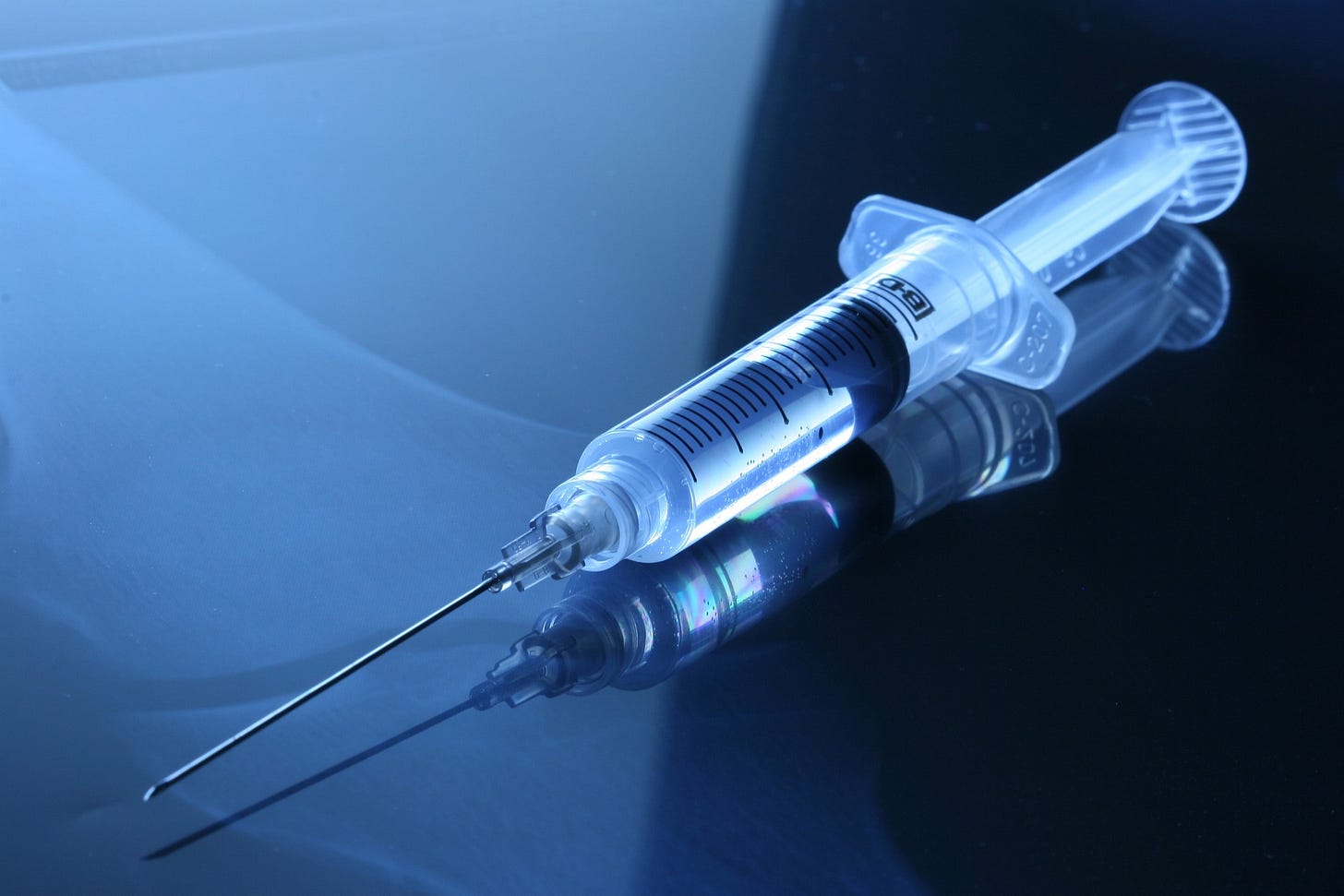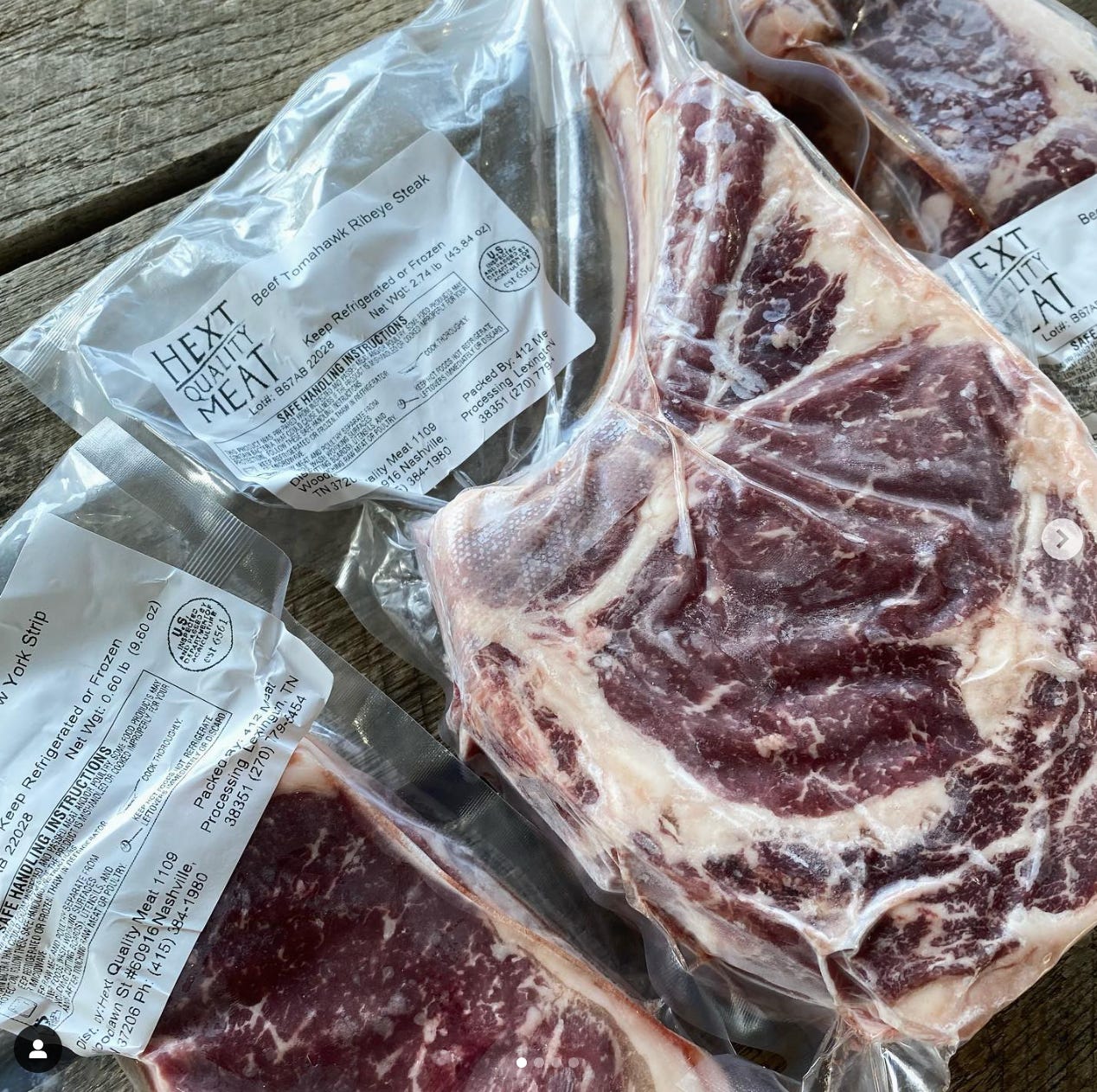Unjected Investigates: mRNA and the Food Supply
The Unjected Team has been doing quite a bit of research into the scope of the claims being made about mRNA entering the food supply. Here are some of the takeaways.
Article by Scott Armstrong | Unjected.com | @Unjected
As you all know, Unjected began as a place for humans to network with other people who chose not to accept the experimental mRNA injections into their lives. As I am writing this, the Executive Branch of the US Government just declared that the COVID-19 “pandemic emergency” is now officially over. So does that mean that mRNA technology can be put back into a wooden crate, nailed shut and transported to some warehouse never to be seen again, like in the final shot of Indiana Jones and the Raiders of the Lost Ark?
No. Of course not.
After the world was subjected to an mRNA mass-injection campaign with a product that was neurotoxic, created NEGATIVE immunity after a period of around 8 months and that was ultimately found to have a “net harm” for those who received it (among many other concerns), the world was ready to move on. But without the COVID emergency in place, how can they possibly justify continuing to plunge this toxic concoction into people’s bodies?
We may now be entering a new era where instead of a needle, the mRNA delivery system might be the food supply.
The Unjected Team has been reaching out to dozens of farms all over the country to glean as much information as possible and we will share that information with you here.
Let’s Clarify
Now, it is absolutely crucial at this point in time to be very clear what we’re talking about. We have evidence to suggest that there are talks of transitioning all livestock vaccines into an mRNA based platform, however, from our research, there are no mRNA vaccines currently being deployed at any level of the food supply, either via livestock or plant-goods

Here is a statement issued by the Texas Department of Agriculture:
"Since news of the development of mRNA vaccines and mRNA-related treatments for livestock came to the attention of the Texas Department of Agriculture, we have been working towards developing a fact and science-based assessment of the risks associated with this technology. Our analysis will include the clinical research, the structure of existing Texas law, and the public policy, economic, and production impact of the different policy prescriptions we may adopt. I aim to ensure that Texas agriculture remains safe, trusted, healthy, and wholly uninfected by dangerous or unproven technology."
"I personally take this issue very seriously. No political hot takes. Just a well-reasoned and well-researched proposal based on a wide range of input from stakeholders, scientists, agriculturalists, and other experts. We are looking at this issue at TDA and will share your concerns. Please stay tuned..."
While we don't have full transparency about what is going on with other countries’ livestock vaccination practices, it is clear that no mRNA vaccines are available or being used in the United States. In fact some states like Missouri are actually actively pushing back preemptively with legislation around labeling such meats if it ever were to come to fruition.
That being sad, a lot of the meat in the grocery stores comes from other countries, so we should remain skeptical.
In our research, we stumbled across a great breakdown by Glenn Elzinga from Alderspring that does a great job of not only describing the current state of the livestock vaccine protocols (which we found varied quite a bit throughout the industry, which we will show you), but also explains what they are anticipating as an industry as a whole when it comes to the new, proposed mRNA livestock injections.
Here is a summary of the current state o no f livestock vaccination from Elzinga’s article:
For most of the last century, animal vaccines fell into two categories. The first is modified live virus (MLV) and killed virus vaccines. The MLVs use the well-established technology of injecting live virus that is able to replicate when injected, but it has been altered so that the virus will not cause clinical disease. Antibodies are then trained to recognize the real virus by the altered one, thus ensuring a halt of disease progression. Killed virus is injected in much larger quantities to provide sufficient antibody training.
The second is through toxoid vaccines, one of the most widely used being the tetanus toxoid. It’s not the tetanus bacteria that causes illness and death; instead it is the toxin secreted by it. The harmless tetanus toxoid is a manufactured substance that emulates the natural toxin without the poisonous effects. Antibodies are ‘trained’ by the manufactured toxoid to bind to the actual toxin and neutralize disease causing effects.
Elzinga goes on to describe some of the concerns of an mRNA based livestock vaccine. These concerns echo that of the concerns that we have when it comes to mRNA injections for humans, but they have a whole new set of concerns specifically around ingesting the meat of an mRNA exposed animal

Here are the two concerns laid out by Elzinga:
Is the vaccine (or mRNA) persistent in meat? Will humans be ingesting mRNA genetic code material via consumption of vaccinated beef, pork or lamb?
Is the vaccine safe in the long term for livestock? Or will it cause subsequent health complications that may then compromise our animal protein food supply?
These are very valid questions. The central point around all of these questions is that we simply do not know. There has not been sufficient time to conduct proper clinical trials, let alone enough time to make any sort of determination about safety or possible unknown side effects.
I really want to encourage all of you to go read Elzinga’s article and support the work they are doing at Alderspring. Here is a final snippet from that article that really resonates with us here at Unjected:
…if indeed we are stuck with only being able to give an mRNA shot, I’m thinking the risk of an untested vaccine in our herd will outweigh the risk of disease contraction.
So, at this point, knowing that we don’t know much about mRNA vaccines, I would say that if all available vaccines became mRNA origin for our cattle, we would no longer administer vaccines to the herd. That’s a lot of cattle. Today, that number is around 650 that we would no longer ever inject with any vaccine.
That is a very bold move and it speaks volumes to the courage that we are seeing across the board from the farmers and ranchers we have been in contact with.
Speaking to the Farmers and Ranchers
As the talk (and the fear) around this issue has began to ramp up, we hoped to quell some of that by getting to the bottom of what is going on by speaking to the people who are boots-on-the-ground, inside the industry. Here are some of the responses that we received (due to the sensitive nature of the topic, we chose not to disclose the farms that these responses came from. We hope this gives you a general idea about what the consensus is among industry insiders):
“We can confidently say that we will not be using any mRNA vaccines in our livestock, but if you have any more questions we would be happy to schedule a time to talk.”
“There are no mRNA vaccines developed or approved in the United States for use in cattle. We will not be using the vaccine in our livestock. “
“We appreciate your interest. The mRNA vaccine is not legally mandated in this country as of yet. We do not agree with that vaccine at all. We and none of our partnering farms utilize the mRNA vaccines. Health and Happiness to you and yours.”
“We are aware of circulating concerns over the use of mRNA vaccines in livestock animals. We can confirm that no one in our supply chain is using any mRNA vaccine nor does any one in our supply chain have any plans to. Further, we are not aware of any actually approved mRNA vaccine let alone any in use.”
“We’ve never given our animals any vaccines and certainly would never give them DNA altering mRNA injections. But, we’re very small scale and don’t deliver or ship our products. Currently the only way to get our products is to pick them up at our farm.”
“We do not vaccinate our cattle with the MRNA vaccine. The cattle are given a vaccine for respiratory health (anti-pneumonia) after birth. This is very important to the overall herd health. Please let us know if you have any other questions.”
“Thank you for asking. Many farms do use a variety of vaccines for their animals. We ONLY do the bare minimum with vaccines and will not implement the use of mRNA vaccinations. We do not give our animals hormones, antibiotics or steroids. We do sometimes give the cattle and sheep a tetanus vaccine when they are young, depending on conditions. The chickens receive some vaccines at the hatchery (typically Coccivac D2 (coccidiosis), HVT/IBD + RISPEN (Marek’s disease) and Sal. Typhimurium (Salmonella Typhimurium) but no additional are given here at the farm. Other than that, we do not give the animals anything. Bison and pork do not receive any. We always make sure that any vaccine is out of the animal’s system for a set amount of time (varies per animal species) before we would harvest”
As you can see, the general consensus among farmers and ranchers, who live this issue day in and day out, are not enthusiastic about this change in the overall conversation related to livestock vaccines. It is going to take all of us banding together to push back on these policies.
Butcher Box, one of larger meat delivery companies, had this to say in response to our inquiry:
Thanks for getting in touch. Currently, there is no approved mRNA vaccine for livestock and poultry, so we can confirm that these animals do not receive mRNA vaccines at this time. Should government regulations change, we will evaluate our strategy with our producers.
While we will be monitoring all updates related to any potential mRNA vaccine regulations, the best sources for real-time information would be regulatory agencies such as the Animal and Plant Health Inspection Service (APHIS) for beef, chicken, and pork sourced in the U.S. and the Australian Pesticides and Veterinary Medicines Authority for beef sourced in Australia.
It would be nice if industry leaders like Butcher Box would use their influence to try and push back against such changes to policy instead of “evaluate strategy with their partners” if government regulations change.
What can we do?
The good news is that there is a solution. We can do what we should have been doing this whole time: we can take our food supply into our own hands.
Reach out to farmers in your community. Begin establishing relationships with them. Ask them this simple question: “Do you plan on utilizing mRNA based livestock vaccines if the time comes when the government forces you to… Or will you be like Glenn Elzinga from Alderspring and tell them to shove off?”
The grocery stores will one day be a major choke point for all of us who desire liberty above all else. They will utilize our dependence on the grocery store to get us to comply with madness or force us to ingest frankenfoods.
Isn’t it nice, though, that the solution is literally taking one extra step and getting to know some farmers and ranchers, some of the most amazing people you will ever meet in your life, and supporting them directly instead of corporate grocery chains?
Begin establishing those relationships now. If things ever become dire, think about who they will prioritize, some joe-schmo off the street or you and your family who has been supporting their family all along. Now is the time.
Stay Natural. Stay Free. Stay Unjected.
Thank your for your ongoing support of Unjected. We want to invite you join the Unjected Substack for as little as $5.55 a month to help support all of our contributors and help us elevate Unjected.com towards being the best community-building site online.
Consider upgrading to the Founding Member tier for a FREE month of Unjected Premium and receive an exclusive Unjected Founding Member shirt as well.









